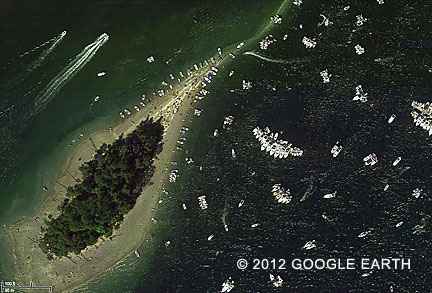boater guidelines
Boat harassment endangers life of newborn seal pup - stay back!
Aug/04/13 07:43 AM
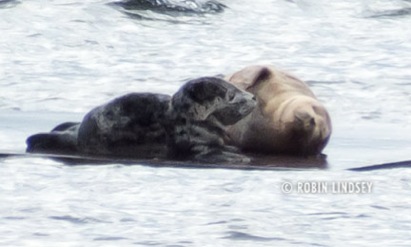
What we’re certain of now, however, is that the pup is between 4-10 days old. Based on our photo obtained yesterday, showing a shred of umbilicus still attached, WDFW’s marine mammal biologist estimated the age is closer to 4 days. Because of the high disturbance yesterday of racing outrigger canoes and boat traffic, the adults quickly abandoned the platform yesterday morning, leaving newborn Sparkle and a larger yearling as the sole occupants. The adults never returned and as of late last night, the platform was empty.
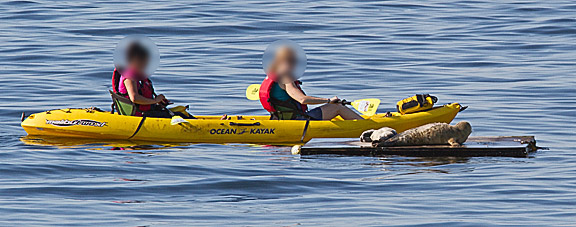 Throughout the day, a steady stream of kayakers and boaters came way too close to the platform, some within only a few yards - harassment in the eyes of NOAA Office for Law Enforcement (OLE) and a violation of the Marine Mammal Protection Act. Stay back from all resting seals, whether on rafts, docks, buoys or shore. Incidents (such as the one shown of two kayakers) are being documented and photographic evidence of violations will be sent to OLE for investigation. Violations are punishable by fine and severe violations are punishable by jail time. Read more about boater guidelines here.
Throughout the day, a steady stream of kayakers and boaters came way too close to the platform, some within only a few yards - harassment in the eyes of NOAA Office for Law Enforcement (OLE) and a violation of the Marine Mammal Protection Act. Stay back from all resting seals, whether on rafts, docks, buoys or shore. Incidents (such as the one shown of two kayakers) are being documented and photographic evidence of violations will be sent to OLE for investigation. Violations are punishable by fine and severe violations are punishable by jail time. Read more about boater guidelines here.What’s all the fuss? Adult harbor seals have learned of the dangers of humans and dogs and are very wary of disturbance. If there is too much activity around a mom’s pup, she may flee the area and abandon him. Because of the constant activity around the platform, this tiny pup who cannot survive on his own, may have been given a death sentence by boaters who insisted on coming too close - potentially permanently scaring the mom away. Human interference has dire consequences for seal pups, often resulting in death.
We want the seals to be able to depend on use of this lone platform (until recently, there were two more providing sanctuary at this location) to rest and regulate their body temperature. Undisrupted, stress-free rest is critical to their survival. If they are chased from this safe refuge, they must turn to the beach - with the dangers of off leash dogs and unwitting beach-goers. This tiny pup would be helpless alone on the beach without a mother’s protection. Please respect seals’ space and stay back 100 yards whenever possible. This also includes people observing the platform from shore - please watch from a distance and not directly across from the seals which causes undue stress. If you’d like information on building an off shore platform to help wildlife survive, please contact us.
Seal pups sometimes seek rest on paddle boards and kayaks
Jul/12/13 09:36 AM
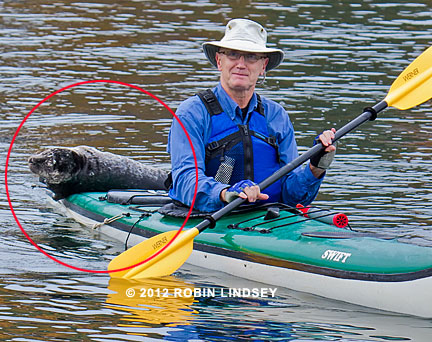
Last year, Seal Sitters’ hotline received a call from a kayaker near Elliott Bay’s Jack Block Park. Jeff Kelley reported that a seal pup had hopped onto the back of his craft and seemed content to rest there indefinitely. After 45 minutes, Jeff and his son needed to continue on their way and he wasn’t quite sure what to do. Our responder met him at the park’s shoreline but, even with nudging of the paddle, this snoozy pup had no intent of disembarking his fine haul out. Jeff began rocking the kayak back and forth and the hitchhiker reluctantly slid off and swam away.
Jeff did everything right. The pup, nicknamed Sealy Dan, got a much-needed respite from the cold waters and was not taken far away from his or her territory. And Jeff and his son, visiting from the East Coast, got a wonderful story to cherish.
If you’d like a copy of our “boater guidelines for marine mammals” poster for your kayak or paddleboard club or to post at your marina, please email us.
Fourth of July no picnic for wildlife - stay away from seal haulouts
Jul/03/15 12:52 PM
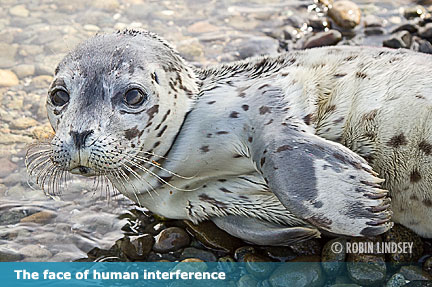
Harbor seal haulouts are full of pregnant females and newborn pups in South Puget Sound and pups can be found all along the Washington coastline and inland waterways. Harbor seals also use jetties, breakwaters and log booms for haulouts.
Please stay a minimum of 100 yards away from resting seals. Like all marine mammals, they are protected from harassment by the Marine Mammal Protection Act and Washington State law RCW 77.15.130 (a criminal misdemeanor, mandatory court appearance, punishable with up to 90 days in jail and up to $1000 fine).
Pups pay a terrible price for human disturbance. The pup shown above was found in 2012, starving on Cutts Island, along with two other emaciated pups and several dead ones. All had been abandoned by their mothers because boaters disrupted the seal colony on this small island near Gig Harbor. A day of boating fun for people can be a death sentence for seal pups. During boating season, thousands of boats can be moored offshore at Cutts disrupting this historic harbor seal haulout (called a “rookery” during pupping season). This past weekend, Boy Scout Troop 1519 along with WDFW staff posted warning signs on Cutts and surrounding beaches that seals are protected by Federal law and to stay back.
If you find a spot for your picnic on a beach near a harbor seal, please move your picnic to another beach. There are reports of people with blankets and coolers surrounding a lone seal pup - finally calling the stranding network wondering why the mother did not return. A harbor seal mom, shy and wary of humans, will abandon her pup if people and dogs are around! Use common sense and help protect wildlife from harassment.
If you are boating or kayaking, please stay far away from resting harbor seals. In 2010, we documented a speeding boat intentionally flushing seals from a protected island rookery with a sign posted “closed harbor”. In the photo below, you can see the boat scaring hundreds of seals from the beach, including pregnant females and many newborn pups. A female was giving birth right at that very moment and, terrified, she left her newborn pup, still in a bloody birth sac, alone on the deserted beach. The mom had no time to memorize the scent or call of her pup, which often leads to abandonment. Thankfully, a full 20 minutes after the boat left with the people onboard laughing, the mom returned to nurse her pup. More often than not, that pup would have been abandoned and slowly starved to death.
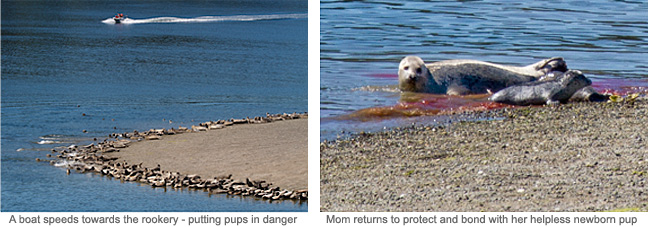
It is not a laughing matter to harass seals. It is a matter of life and death for seal pups. This incident was investigated by NOAA’s Office for Law Enforcement. Harassment is not just poking with sticks (yes, we have witnessed that) or scaring an animal back into the water - any change in an animal’s behavior caused by your presence is considered a “take” by law. This Federal law also prohibits touching, moving and feeding seal pups.
Many state parks on islands in the San Juans, Central and South Puget Sound have harbor seal rookeries. Do not approach animals by boat or by land. Please, be respectful and move your party elsewhere. If you see a violation, please call NOAA Office for Law Enforcement: 1-800-853-1964 and your local stranding network.
Boat launches and docks can have newborn or weaned pups sleeping on them or nearby, often in danger from propeller strikes or being run over by boat trailers. In some coastal areas, people are allowed to drive vehicles on the beach itself. On July 4th weekend in 2011, a pup was run over and killed on the beach at Ocean Shores - other animals, sick or weak and unable to move quickly, have been run over on beaches at Westport (California sea lion pup), Long Beach Peninsula (California sea lion), and Twin Harbors (adult harbor seal) at different times of the year. Please immediately report any pup (or adult) that is at a dangerous location or being harassed to your local stranding network.
Please be aware of your surroundings and give animals a break this holiday. Respect that harbor seals need to rest and nurse. Celebrate responsibly and you just might save the life of a seal pup. Fireworks are a moment’s thrill that can have heartbreaking consequences for wildlife.
Sea lion harassment will be reported to NOAA law enforcement
Mar/31/13 09:11 AM
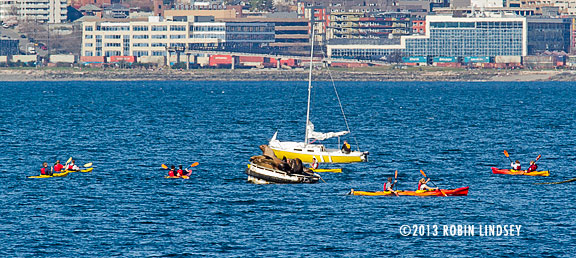
Fair warning to all recreational boaters, including kayakers:
Any harassment of the sea lions resting on the Elliott Bay buoys is being photographed and sent to NOAA’s Office for Law Enforcement. The Marine Mammal Protection Act (MMPA) prohibits harassment of marine mammals. Stay 100 yards away from any marine mammal resting on shore, buoys, or in the water. It is against Federal Law for boaters to be as close as shown above, taken yesterday afternoon.
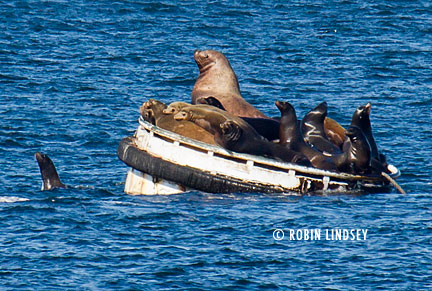
A highlight to any day in West Seattle is to get out on the water and enjoy wildlife. If you don’t have a boat or kayak, you can rent one at Alki Kayak Tours. Please comply with the MMPA as you enjoy your boating activities and observe these majestic animals from a respectful distance. This also includes resting seal pups along our shoreline. Resist the temptation to get close. All pinnipeds require time out of the water to rest and regulate their body temperature - it is critical to their health and survival.
If you see a violation and are able to take a photo, try to get a boat license number if at all possible and email photos to us. We will forward to Office for Law Enforcement.
Respect harbor seal haulouts - it's life and death for seal pups
Aug/12/12 08:58 PM
Boaters, kayakers and jet skiers: Please be aware that locations where harbor seals gather are sensitive and vital areas - and disturbances to seal colonies can be devastating for newborn pups. Many Puget Sound islands have state parks with seal haul outs, where the animals gather in numbers to rest and, this time of year, give birth and nurse their young. Adult harbor seals are extremely skittish and the slightest disturbance can cause a stampede into the water, often leaving vulnerable pups alone on shore. If people land watercraft or swim or picnic close to a pup, the mom may well abandon him. On a state park island last year, WDFW Marine Mammal Investigations’ biologist found a group of picnickers surrounding a pup and was told they were “waiting for the mom to return.” It is no surprise that the mom never did.
This week, our lead responder accompanied that biologist on observations of South Puget Sound harbor seal rookeries. Responding to a report of a dead seal pup on that same small island with a known seal colony and a history of conflict with recreational boaters, we found two dead pups as well as three that were emaciated and weak, but alive - and several boats and a number of people way too close. We were told that just before we arrived a man tried to put one of the pups back into the water (one of many instances, we are sure). There is no chance a mom will return to take care of her pup under these circumstances. At right is a photo which shows the tiny island on a typical August day - a virtual flotilla of boats and people (click on the Google Earth photo to enlarge). There are reports of 100 boats at this island on a weekend.
This video shows seals fleeing from a nearby South Puget Sound rookery - as an eagle lands near them. You can imagine their terror when a boat lands on their beach.
Enforcing the Marine Mammal Protection Act in remote areas is challenging. Park rangers are few and far between and access to respond to islands is especially difficult. Signs that are posted are either torn down or graffitied beyond recognition. It appears that too many humans feel that their “right” to be in nature supersedes animals’ rights to survive in their daily life and death struggle. We are dependent upon the public to spread the word that no matter where you are, if you encounter a marine mammal on the beach, you are to stay 100 yards away. If someone is harassing a pup on the beach, call Seal Sitters’ hotline @ 206-905-7325 (SEAL) immediately and we will contact the proper authorities. Take a discreet photo of a boat showing license number - NOAA Office for Law Enforcement has a better chance of prosecution with physical evidence. Do not put yourself in harm’s way. If you find a pup that appears to be abandoned, keep your distance and call the hotline.
This week, our lead responder accompanied that biologist on observations of South Puget Sound harbor seal rookeries. Responding to a report of a dead seal pup on that same small island with a known seal colony and a history of conflict with recreational boaters, we found two dead pups as well as three that were emaciated and weak, but alive - and several boats and a number of people way too close. We were told that just before we arrived a man tried to put one of the pups back into the water (one of many instances, we are sure). There is no chance a mom will return to take care of her pup under these circumstances. At right is a photo which shows the tiny island on a typical August day - a virtual flotilla of boats and people (click on the Google Earth photo to enlarge). There are reports of 100 boats at this island on a weekend.
Enforcing the Marine Mammal Protection Act in remote areas is challenging. Park rangers are few and far between and access to respond to islands is especially difficult. Signs that are posted are either torn down or graffitied beyond recognition. It appears that too many humans feel that their “right” to be in nature supersedes animals’ rights to survive in their daily life and death struggle. We are dependent upon the public to spread the word that no matter where you are, if you encounter a marine mammal on the beach, you are to stay 100 yards away. If someone is harassing a pup on the beach, call Seal Sitters’ hotline @ 206-905-7325 (SEAL) immediately and we will contact the proper authorities. Take a discreet photo of a boat showing license number - NOAA Office for Law Enforcement has a better chance of prosecution with physical evidence. Do not put yourself in harm’s way. If you find a pup that appears to be abandoned, keep your distance and call the hotline.
